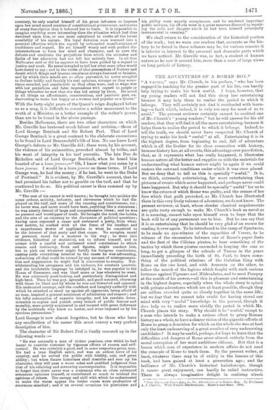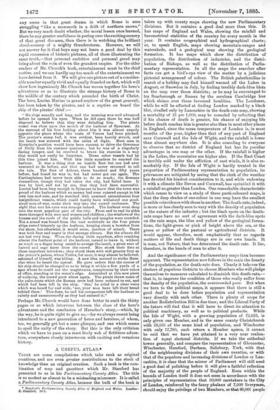THE ADVENTURES OF A ROMAN BOY.*
"A WRITER," says Mr. Church, in his preface, " who has been engaged in teaching for the greater part of his life, can hardly help trying to make his book useful. I hope, however, that my young readers will not find this story less entertaining because it may help them to realise the period to which it belongs. They will certainly not find it overloaded with learn- ing—a fault which, indeed, it is only too easy for most of us to avoid." The present reviewer certainly cannot be counted one of Mr. Church's " young readers ;" but he will answer for his old readers, that they will find it all the more entertaining, because it helps them to realise the period to which it belongs. Indeed, to tell the truth, we should never have suspected Mr. Church of trying to make his book " useful " at all. Entertaining it is in the highest degree, from beginning to end, full of adventure which is all the livelier for its close connection with history, because history has, at all events, this advantage over pure fiction, that, as it represents what has really happened, it illustrates human nature all the better and supplies as with the materials for understanding what human nature might be again if we could restore the outward conditions under which it was once placed But we deny that to tell us this is specially " useful." It is, we think, extremely entertaining, far more entertaining than pictures of events which never happened, and perhaps never could have happened. But why it should be specially " useful " for us to know the crimes of which Rome was guilty, and the crimes of her foes which that guilt provoked, as Mr. Church has illustrated them in this very lively volume of adventure, we do not know. The present reviewer, at least, whose slender classical acquirements are quite rusty enough to make Mr. Church's book as novel as it is amusing, cannot take upon himself even to hope that the book will be of any permanent use to him. But he can say that it is so entertaining that he should be very glad of an excuse for reading it over again. To be introduced to the camp of Spartacus, to be made an eye-witness of the rapacities of Verres, to be witness of the encounters between one of Rome's paper fleets and the fleet of the Cilician pirates, to hear something of the tactics by which these pirates succeeded in keeping the seas so long, to get a glimpse of the schools of Tarsus in the years immediately preceding the birth of St. Paul, to learn some- thing of the political relations of the Galatian King with Rome on the one hand, and with Armenia on the other, to follow the march of the legions which fought with such various fortunes against Tigranes and Mithradates, and to meet Pompey at the zenith of his power,—all this is pleasant and entertaining in the highest degree, especially when the whole story is spiced with private adventures which are at least possible, though they are seldom crowded quite so closely together in the same life ; but we fear that we cannot take credit for having stored our mind with very "useful" knowledge in the perusal, though it does help us to realise more vividly the period in which Mr. Church places his story. Why should it be ' useful,' except to a man who intends to make a serious effort to grasp Roman history as a whole, to have a clearer vision of the gigantic efforts of Rome to grasp a dominion for which on the whole she was at best only the least undeserving of a great number of very undeserving candidates ? It maybe useful, perhaps, for boys to learn that the difficulties and dangers of Rome arose almost entirely from the moral corruption of her most ambitions citizens. But that is a lesson which men of experience in modern affairs do not need the example of Rome to teach them. By the present writer, at least, whatever there may be of utility in the lessons of this book, had been gained at least a generation ago ; and the brilliance of Mr. Church's historical kaleidoscope, though it causes great enjoyment, can hardly be called instructive. There is always imaginative delight in realising afresh • Two Thclt.und Years Ago; or, the Adventures of a Rowan Boy. By Professor I. J. Church. With Twelve Illustrations. Blaokie and Sons. 1880.
any scene in that great drama in which Rome is seen straggling " like a mammoth in a drift of northern snows." But we very much doubt whether, the moral lesson once learned, there be any greater usefulness in poring over theexcitingscenery of that great diorama, than there is in watching the brilliant cloud-scenery of a mighty thunderstorm. However, we will not answer for it that boys may not learn a good deal by this rapid succession of historic pictures, all of them illustrating the same truth,—that personal ambition and personal greed may bring about the ruin of even the grandest empire. For the older readers of Mr. Church's book, entertainment must be the chief motive, and we can hardly say too much of the entertainment we have derived from it. We will give one picture out of a consider- able number equally vivid and equally founded on fact, which will show how ingeniously Mr. Church has woven together his hero's adventures so as to illustrate the strange history of Rome in the middle of the century which preceded the birth of Christ. The hero, Lucius Marius (a grand-nephew of the great general), has been taken by the pirates, and is a captive on board the ship of the pirates' chief :-
" He slept soundly and long, and the morning was well advanced before he opened hie eyes. When he did open them he was half disposed to believe that they were deluding him. The pirate vessel was close upon the mouth of the harbour of Syracuse. At the moment of his first looking about him it was almost exactly opposite the place where the tents of Ferree had been pitched. The praetor's camp bad, it was evident, been hastily struck, and the beach was strewed with the relics of flight. Most men in Heracleo's position would have been content to drive the Governor of Sicily from his summer quarters ; but he was of a singularly daring temper, and he resolved to brave his enemies in a way that would not easily be forgotten. Three other vessels had by this time joined him. With this little squadron he entered the harbour. It was a thing that no hostile fleet but one had ever ventured to do before, and that one had never returned to tell the tale. The fleet of Athens, three hundred and fifty years before, had found its way in, but had never got out again. The Carthaginians bad never been able to do so much ; the Romans themselves, though they bad taken the city, had failed here. It was by land, and not by sea, that they had been successful. Lucius had been long enough in Syracuse to know that the town was proud of the harbour which no enemy bad ever entered except to his own lose and ruin, and he watched with unmixed astonishment four insignificant vessels, which could hardly have withstood one good- sized man-of-war, make their way into the sacred enclosure. The sight that met his eyes was strange indeed. The harbour went deep into the most populous part of the city. From end to end its sides were thronged with men and women and children ; the windows of the houses and the roofs of the public halls and temples were crowded. Not a sound was heard from the vast multitude as the four pirate ships rowed leisurely np the harbour, keeping about a bowshot from the shore, but otherwise, it would seem, careless of attack. There was both fear and anger in that strange silence. Bat the silence did not last very long. When the daring little squadron, after reaching almost the furthest point of the harbour, turned to leave it, without so much as a finger being raised to avenge the insult, a great roar of hatred and rage burst from the crowd. Men shook their fists at these impudent intruders ; they shook them with still greater fury at the prmtor's palace, where Ferree, for once, it may almost be believed, ashamed of himself, was hiding. A new idea seemed to strike Hera- oleo when he heard the uproar. He gave orders that the course of his ship should be changed so as to bring it within a few yards of a spot where he could see the magistrates, conspicuous by their robes of office, standing at the water's edge, Astonished at this new piece of audacity, the crowd grew silent again. The pirate threw some of the palm-roots which the Roman crew had been reduced to eat, and which had been left in the ship. See,' be cried in a clear voice which was heard far and wide, ' see, your men have left their bread behind them.' This done, he and his companions left the harbour as calmly and unconcernedly as they had entered it."
Perhaps Mr. Church would have done better to omit the thirty pages or so which intervene between the close of the hero's adventures and the conclusion of Heracleo's story,—which, by the way, he is quite right to give us,—for we always resent being introduced to a new generation of heros and heroines, of whom, too, we generally get but a mere glimpse, and one which seems to spoil the unity of the story. But this is the only criticism which we have to pass on a most lively web of fictitious adven- ture, everywhere closely interwoven with exciting and veracious history.















































 Previous page
Previous page